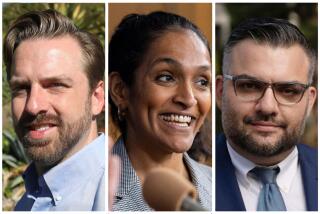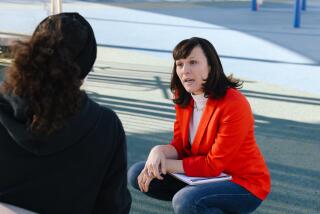Candidates in 4th Council District tap into ire over development
Anger over how Los Angeles is permitting development — from vast shopping centers to the McMansion next door — is all but constant on the campaign trail as more than a dozen candidates compete to represent the 4th City Council District, a grab bag of far-flung neighborhoods such as Sherman Oaks, the Hollywood Hills and Hancock Park.
In the Hollywood Hills, candidates have been questioned about whether they would forswear campaign money from developers. In Sherman Oaks, the rivals were quizzed about whether they would have approved a controversial apartment complex on Sepulveda Boulevard.
And in the Miracle Mile, one enterprising resident is nudging candidates to sign a pledge saying that they would immediately share online whenever they were approached by developers about budding projects.
“It just seems like development has gone on steroids,” said Jim O’Sullivan, president of the Miracle Mile Residential Assn. “And the council just passes everything through.”
For the candidates stumping to replace termed-out Councilman Tom LaBonge, railing against seemingly out-of-control development is a clear way to score points with many of the voters who live in one of the city’s more affluent and politically engaged areas.
At community forums, there is frustration with “mansionization” as homes are torn down and replaced with bigger ones, annoyance with large developments that neighbors fear will worsen traffic and suspicion of the political pull of major developers.
Candidate Joan Pelico, who works as an aide to Councilman Paul Koretz, said her thoughts on development were the same across the entire sprawling district: “No more in CD 4,” she wrote in response to questions from The Times. “No more out of compliance and out of character development.”
But though there is widespread agreement that the system for vetting and approving development is broken, the question of what the candidates would do to fix it is more complicated.
Several complain that council members are allowed to wield too much power to decide what is built in their respective districts, resulting in unpredictable and inconsistent decisions. “Every City Council member is an absolute dictator of development” in their district, said candidate and former state lawmaker Wally Knox.
Knox says the solution is creating new community plans for the 4th District, with hard-and-fast rules that cannot be “tinkered with” — either by adopting them through a city ordinance or asking voters to change the City Charter. He also wants developer fees to go directly to the community affected by each development.
Businesswoman Sheila Irani suggests another fix: She wants the city to create a new position — a paid advocate within the Department of Building and Safety who will represent community concerns. She likened the job to the ratepayer advocate that monitors the Department of Water and Power.
Jay Beeber, an activist known for battling red-light traffic cameras, said part of the problem is a mechanism that allows council members to override decisions made by city commissions. He wants to ban lawmakers from using that tool, known as a “245” for the section of the City Charter that allows it, to veto planning decisions that would benefit any political contributors.
And Tara Bannister, who works for the National Apartment Assn., argued that ironing out the arcane zoning code would mean Angelenos no longer need politicians to negotiate deals.
Many candidates argue that city planning needs a wholesale makeover. Teddy Davis, who once served as an aide to former Mayor Antonio Villaraigosa, suggested the city revise its “outdated” community plans and pursue a “top-to-bottom overhaul of the planning department.
He pointed to legal setbacks, including a ruling that halted construction of a Target in Hollywood, as a sign that city planners were either facing political pressure to approve projects that couldn’t survive a legal challenge or the rules were so complicated that planners didn’t know what was legal. Candidate Mike Schaefer, who once served on the San Diego City Council, was also riled by the example of the unfinished Target, saying that developers need to be able to “bank on” city reviews of their projects.
David Ryu, who works for a community health center, says the solution is to have more community participation at the outset so that irritated neighbors don’t end up going to court. Pelico raised the same point, saying developers and residents need to have open discussions to achieve projects that fit in each community.
Candidates have also singled out developers as a poisonous political force. Davis declared early in the race that he wouldn’t take campaign contributions from developers, and ended up returning a number of contributions he had accepted before making that pledge.
The same promise was made by Beeber and Irani, who later clarified she would accept money from “affordable or homeless housing developers.”
Others, including former LaBonge aide Carolyn Ramsay and marketing executive Fred Mariscal, have taken aim at the city’s failure to hold developers to the promises they make in return for permission to build, such as providing community perks. Ramsay said the city should change how it crafts such development agreements so they stand up in court, and then increase fees on developers to pay for more city staffers to enforce them.
Ramsay also railed against outdated rules. “We still have codes on the books from the 1940s,” she said.
Another frequent complaint is that L.A. has allowed too much new development without weighing how it will affect traffic and services. Tomas O’Grady, a nonprofit director, argued that the city has “jumped the gun” in pushing development around mass transit in Hollywood. He said that though it makes sense to build homes and apartments around transit lines, the city needs to instill more incentives for people to drive less, such as lower property taxes for condo owners who don’t use cars.
Steve Veres, who serves as Los Angeles director to state Sen. Kevin de León (D-Los Angeles), pointed to the fact that City Hall has allowed more density for development projects than neighboring cities, through bonuses for affordable housing and transit-oriented development. He argued that the scale of new developments should be tied to assessments of how they will affect city infrastructure, and that any needed work — such as replacing sewer systems — should be done before the building is occupied.
Both Bannister and Ross Sarkissian, who owns a small business marketing and consulting firm, say officials should spread out development instead of packing more projects into Hollywood and other densely populated areas of the district. Mariscal, in turn, has suggested placing a moratorium on new development along part of Sunset Boulevard if community leaders want it.
“I’m not anti-development,” Mariscal said. Still, he argued, “we need to take a step back.”
More than 150,000 residents are registered to vote in the nonpartisan race. If no candidate gets more than 50% in the March 3 primary, the top two will face a runoff May 19. The winner would take office July 1.
Candidate Step Jones declined to respond to a Times questionnaire asking for his position. For more information on where the candidates stand on development and other issues, check out our interactive graphic.
Follow @LATimesEmily for breaking news from Los Angeles City Hall
Memorable story of mansionization: When the ‘Starship Enterprise’ is your neighbor
More to Read
Start your day right
Sign up for Essential California for news, features and recommendations from the L.A. Times and beyond in your inbox six days a week.
You may occasionally receive promotional content from the Los Angeles Times.






